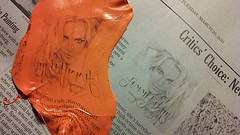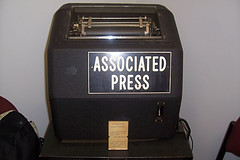Text
Much Ado About a DMCA Takedown Notice
Citizen Counter-Surveillance of the Police? There's an App For That.
How Should We Measure Damages for Defamation Over Social Media?
U.S. Marine Faces Uphill Battle in First Amendment Challenge
Jenzabar v. Long Bow: Oral Argument Focuses on Initial Interest Confusion and Search Engine Results
Brown v. Doe
Kessler International v. Citizen Media Law Project
Are Retweets Endorsements?: Disclaimers and Social Media
White, et al. v. West Publishing Corporation, et al.
Guadagnini Violin Shop v. TruthTeller1790
M.A. v. Village Voice Media, LLC
Righthaven is no more! It has ceased to be! It's expired and gone to meet its maker!
Copyright 2007-25 Digital Media Law Project and respective authors. Except where otherwise noted,
content on this site is licensed under a Creative Commons Attribution-Noncommercial-ShareAlike 3.0 License: Details.
Use of this site is pursuant to our Terms of Use and Privacy Notice.
content on this site is licensed under a Creative Commons Attribution-Noncommercial-ShareAlike 3.0 License: Details.
Use of this site is pursuant to our Terms of Use and Privacy Notice.


 Here is a story that would be an excellent fact pattern for a media law exam. Copyright! DMCA! Libel! Oh my…. Well, at least I hope it will be a topic of interest for the readers of this blog.
Here is a story that would be an excellent fact pattern for a media law exam. Copyright! DMCA! Libel! Oh my…. Well, at least I hope it will be a topic of interest for the readers of this blog.
 Despite the welcome 7th Circuit decision
in
Despite the welcome 7th Circuit decision
in  On April 24, 2012, a Texas jury
On April 24, 2012, a Texas jury  What happens when the First Amendment collides with military decorum and respect for chain of command?
What happens when the First Amendment collides with military decorum and respect for chain of command?
 “RTs do not = endorsements.”
“RTs do not = endorsements.”
 If there is a polar opposite to organizations like ours, it is the intellectual property troll. And in the IP troll heirarchy, one of the trolliest has long been Righthaven, the self-described "pre-eminent copyright enforcer" that sued hundreds of bloggers and other Internet denizens apparently as part of its business model. If the DMLP, the EFF, Public Citizen, and the like are the Justice League, Righthaven would be in the Secret Society of Supervillians.
If there is a polar opposite to organizations like ours, it is the intellectual property troll. And in the IP troll heirarchy, one of the trolliest has long been Righthaven, the self-described "pre-eminent copyright enforcer" that sued hundreds of bloggers and other Internet denizens apparently as part of its business model. If the DMLP, the EFF, Public Citizen, and the like are the Justice League, Righthaven would be in the Secret Society of Supervillians.
 At a recent presentation during which I reviewed a number of cases and
court rule changes regarding juror use of social media and the Internet
during trial, an audience member asked me why American courts appeared
to be so lax in the face of such juror misbehavior, such as the Texas
case in which a juror who sent a "friend" request to the defendant in a
personal injury case
At a recent presentation during which I reviewed a number of cases and
court rule changes regarding juror use of social media and the Internet
during trial, an audience member asked me why American courts appeared
to be so lax in the face of such juror misbehavior, such as the Texas
case in which a juror who sent a "friend" request to the defendant in a
personal injury case  By now you might have heard about
By now you might have heard about  Say you're in law school, and your professor gives you the following hypothetical:
Say you're in law school, and your professor gives you the following hypothetical:
 Looking to make their brand “a little more memorable,” the News Licensing Group is now
Looking to make their brand “a little more memorable,” the News Licensing Group is now 
Description:
On March 3, 2011, Bobby Bland, along with five coworkers in the Sheriff's Department in Hampton, Virginia, sued their former employer, Sheriff B.J. Roberts, in the U.S. District Court for the Eastern District of Virginia alleging wrongful termination due to their support of Sheriff Robert's opposition in a 2009 re-election campaign. In their complaint, the plaintiffs claim Sheriff Roberts violated their First Amendment rights to freedom of speech and freedom of association when he fired them in December 2009 after he was re-elected. Four of the plaintiffs are sworn, uniformed deputy sheriffs. Bland and another plaintiff are unsworn, non-uniformed civilian employees within the Sheriff's Office.
The complaint alleges that Sheriff Roberts fired Bland and others because they supported the Sheriff Robert's opposition, Jim Adams, who previously worked at the Sheriff's Office for 16 years and was third in command as Lieutenant Colonel, though he had recently resigned in order to run against Roberts. The plaintiffs contend that Sheriff Roberts found out about their support of Adams, including two plaintiffs' online support of Adams' Facebook page (Carter, McCoy), one plaintiff "liking" Adams' Facebook page (Carter), other plaintiffs attending a campaign cookout allegedly for Adams (McCoy, Sandhofer, Carter), one plaintiff displaying a bumper sticker supporting Adams and making a negative statement with profanity to a poll worker about the Sheriff's election material (Dixon), and one plaintiff refusing to actively support the Sheriff Robert's reelection efforts as she had done in the past (Woodward).
The plaintiffs further allege in their complaint that Sheriff Roberts knew of their active support of Adams, and that their terminations were "unlawful, retaliatory and improper in that the Defendant B.J. Roberts effected these terminations because the Plaintiffs exercised their rights to freedom of speech in refusing to support Roberts' re-election efforts and in actively supporting Roberts' opponent." They also allege that the Sheriff "used his authority to bolster his reelection efforts" by soliciting them to provide services in support of those efforts, including selling and buying tickets for campaign fundraisers. They demand monetary relief and reinstatement to their prior positions.
On December 9, 2011, Sheriff Roberts filed a motion for summary judgment in which he argued that there was no genuine issue of material fact because plaintiff's did not provide sufficient evidence on their First Amendment Retaliation Claim and First Amendment Assoication Claim. Roberts said he fired the plaintiffs because of poor work performance, budget constraints and lack of harmony and efficiency" in the Sheriff's Office, not because of their support for Adams. Further, he alleged that during the 2009 election, he "had no knowledge of whether plaintiffs or any other appointee supported him or Adams."
In response to plaintiffs' First Amendment claims, Roberts argued that the claims fail because there was insufficient evidence to prove a "casual nexus between their alleged speech and Sheriff Roberts' decision not to reappoint them," citing McVey v. Stacy, 157 F.3d 271 (4th Cir. 1998). Similarly, the motion argues that plaintiffs' freedom of association claims must fail because plaintiffs could not establish any direct causation between their termination and their political support of Adams. In addition, Sheriff Roberts offers affirmative defenses that he is entitled to qualified immunity in his individual capacity, and that he is barred by the Eleventh Amendment from being sued in his official capacity as Sheriff.
Plaintiffs filed their opposition to the motion for summary judgment on December 23, 2011, responding that there was a dispute of material fact as to whether they were terminated on the basis of (1) their political affiliation, in violation of their First Amendment rights as articulated in Elrod v. Burns, 427 U.S. 347 (1976) and (2) protected employee speech on matters of public concern under the Pickering and Connick test, balancing whether a public employee's speech is constitutionally protected. Pickering v. Board of Education of Township High School District, 391 U.S. 563 (1968); Connick v. Myers, 461 U.S. 138 (1983). The first argument was asserted by all plaintiffs; the latter claim was asserted only by Plaintiffs Carter, Dixon, McCoy and Woodward.
In the Sheriff's reply to the plaintiffs' opposition, he argued that plaintiff's First Amendment claims fail because they were not engaging in First Amendment expression that is protected by the Constitution. Sheriff Roberts argues that Plaintiff Carter and McCoy's activities on Facebook, Plaintiff Woodward's conduct, and Dixon's statement to a poll worker were not constitutionally protected speech. Furthermore, Roberts alleges that plaintiffs could not prove that he [Sheriff Roberts] knew about their support of Adams or that he made his hiring decisions based on those facts.
On April 24, 2012, the District Court granted the defendant's Motion for Summary Judgment, holding that the plaintiffs asserting rights of freedom of speech failed to the first prong of the McVey test, i.e., speaking out on a matter of public concern, because they did not sufficiently engage in "expressive speech." While the election process was certainly a matter of public concern, the court found that the alleged speech at issue -- "liking" an opponent's Facebook page, having a car bumper sticker, allegedly using profanity at an election booth about the Sheriff's campaign literature, and refraining from supporting the Sheriff -- was not speaking out, and therefore was not speaking at all.
The court further explained that Plaintiff Carter's "liking" of Adams' Facebook page was "insufficient speech to merit constitutional protection." The court held further that "[i]n cases where courts have found that consitutional speech protections extended to Facebook posts, actual statements existed within the record," and that "liking" the Facebook page was not an actual statement, but rather just "one click of a button."
The court also ruled against all plaintiffs on their claims of freedom of association, finding that there was insufficient evidence that the Sheriff knew about their "association" with the Adams campaign. Finally the court held that "[e]ven if the Court found that Plaintiffs had adequately stated First Amendment claims, the Sheriff, in his official capacity, would still be immune from liability" under both the qualified immunity doctrine and the Eleventh Amendment. The court based this ruling on the fact that the Sheriff in Virginia is a constitutional officer and that a suit against him in his official capacity is a suit against the State.
The plaintiffs filed a notice of appeal on May 24, 2012.
UPDATE:
July 20, 2012: Plaintiffs/appellants file their brief on appeal, arguing that they could not constitutionally be terminated based upon their political affiliations because they were not in confidential or policy-making positions as to which political loyalty was essential. They further argued that plaintiffs Carter, Dixon, McCoy and Woodward through the actions described above engaged in protected speech on a matter of public concern, that their interests outweighed the interests of the state in the Pickering balancing test, and that the defendant was not entitled to qualified immunity.
August 6, 2012: Facebook files an amicus brief in support of plaintiff/appellant Carter, arguing that a Facebook "like" is constituionally protected speech. The American Civil Liberties Union and ACLU of Virginia also file an amicus brief, arguing among other things that Carter, Dixon, McCoy and Woodward all engaged in protected speech regardless of the clarity, value or medium of the speech.
September 14, 2012: Defendant files his appellee's brief, arguing that the district court correctly rejected all aspects of the plaintiffs' claims.
October 1, 2012: Plaintiffs file their reply brief. The reply presented additional arguments that the defendant was aware of the plaintiffs' political affiliation with and support for defendant's political opponent, and that the plaintiffs had established that their political activity was the cause of their termination.
September 18, 2013: The Fourth Circuit affirmed the district court in part, reversed in part, and remanded the case.
The Court of Appeals held that Carter, Dixon, and McCoy had identified sufficient disputes of fact to allow their claims for reinstatement of their employment to continue, but affirmed as to all other claims. Specifically, the Court held that Carter, Dixon, and McCoy had engaged in speech protected by the First Amendment (including an extended discussion of the impact of a Facebook "like") and that they raised a material issue of fact as to whether they were terminated for that speech; however, plaintiffs Sandhofer, Woodward and Bland had failed to present evidence warranting an inference that they were terminated for their speech. The Court further found that: (1) there was evidence that Carter, Dixon & McCoy's employment positions were not so entwined with policy that they could be terminated for disloyalty to the Sheriff; (2) their speech was made in their private capacities and related to matters of public concern; and (3) there was no evidence of disruption to the workplace as a result of their speech. Accordingly, the Could held that the claims by Carter, Dixon and McCoy would survive summary judgment on the merits.
However, the Court held that their claims against the Sheriff in his personal capacity were barred by the doctrine of qualified immunity, because prior case law was not clear enough for the Sheriff to know whether the plaintiffs held positions subject to dismissal for breach of loyalty. The Court also found that these three plaintiffs' claims for monetary relief against the Sheriff in his public capacity were barred by the Eleventh Amendment. Nevertheless, the Court held their claims for reinstatement to their prior positions could proceed, because the Eleventh Amendment does not bar prospective relief. In the end, the Court remanded the case to the district court to proceed to trial on Carter, Dixon and McCoy's claims for reinstatement, but affirmed the dismissal of all other claims.
In an extended dissent, Judge Hollander of the Fourth Circuit argued that the Sheriff should not have been entitled to qualified immunity. She stated that prior case law clearly established that the Sheriff should have considered the specific duties with which Carter, Dixon, and McCoy were entrusted, and that taking those duties into account it should have been clear that they did not hold positions that could be terminated for disloyalty.